Best Baby Formula With Prebiotics & Probiotics: The Ultimate 2025 Guide
57 hours of research 6 minute read

When it comes to the baby’s health, parents hate the word “added” in infant formulas. Synthetic additives in baby formulas are poison for infant health. In the case of prebiotics and probiotics, “addition” is a good sign as it usually helps to balance babies digestive system.
Prebiotics and probiotics are healthy buzzwords. These tiny bacteria are essential for building up your baby’s microbiome.
But what exactly are prebiotics and probiotics? Should you give them to your little one? Keep reading to explore what makes these “digestive superheroes” good for your baby’s health. Let's start by taking a quick look at the Infant “Microbiome.”
The Infant Microbiome

The microbiome is a collective term for the bacterial population living in the intestine, especially the colon. The gut microbiota is actually good bacteria that play a critical role in regulating weight and fighting off infections, with many other functions being discovered every day.
For babies, the microbiome is “actively” growing. Some gut microbiomes start developing during pregnancy, while the rest grow during infancy. Surprisingly, whether the baby was born vaginally or via C-section determines the makeup of your baby’s microbiome.
While we cannot change how your baby was born, the baby’s microbiome is highly impacted by infant nutrition. The microbiome of a breastfed baby and the microbiome of a formula-fed baby are quite different from each other. It is because breast milk contains a lot of prebiotics and probiotics and most baby formulas don't, which are considered vital for the growth of a healthy infant microbiome [1].
What Are Probiotics?
Probiotics, commonly known as “good” and “friendly” bacteria, are live microorganisms that populate our intestines. Probiotics keep the digestive tract healthy by pushing food through the gut. Probiotics also prevent the body from harmful bacteria that cause infection and inflammation [2].
According to a study, your gut is home to 10 times more bacteria than the cells you have in your entire body. These bacteria share a symbiotic relationship with our body, meaning that they keep our digestive tract healthy. The most common types of probiotics are strains of lactobacilli and bifidobacteria (Bifidobacterium Lactis).
Breastfed babies take 30% of their microbiome from natural probiotics naturally present in breast milk. Probiotics added in baby formulas replicate the benefits of probiotics present in breast milk. Organic baby formula with added probiotics means that your little one will be less irritated, less inflamed, and at no risk of getting diseases.
What Benefits Probiotics Offer To Infants?
Newborns have a sterile GI system, due to which they become vulnerable to weak immunity and gastrointestinal infections. Probiotics help infants build up good bacteria that modulate immunity, protect the GI tract, and prevent infections. When compared to breastfed infants, the gut flora resulting from breastfeeding is almost as potent and resilient as those found in the intestine of infants using baby formulas enriched with probiotic supplements.
The following are some incredible benefits of probiotics that can make you choose probiotic-enriched formula for your baby:
- Studies suggest that probiotics help prevent infants from irritable bowel syndrome, constipation, colic, ulcerative colitis, and stomach inflammation [3].
- Probiotics maintain a healthy gut by adding “more” bacteria to the gut.
- Probiotics prevent or reduce the risk of diarrhea and atopic eczema in babies.
- Probiotics control the growth of “undesirable” bacteria to prevent inflammation.
- Probiotics have been studied to prevent a rare infection in infants, called necrotizing enterocolitis, that damages the infant’s GI tract [4].
What Are Prebiotics?
Prebiotics are less known but play a crucial role in the growth of probiotics. Prebiotics, also known as human milk oligosaccharides (HMOs), are indigestible carbohydrate fibers that improve the growth of good bacteria (probiotics) in infants’ guts. The combination of prebiotics and probiotics maintains a healthy gut environment, which is good for your baby’s overall health [5]
Prebiotics are present in breast milk in surprisingly high amounts and develop the baby’s immune system, serve as food for probiotics, and prevent infections. Common types of probiotics include:
- Fructo- oligosaccarides (FOS)
- Galactooligosaccharides (GOS)

What Benefits Prebiotics Offer To Infants?
Prebiotics provide the following health benefits to infants:
- Stimulate bowel movements and softer stools
- Strengthen the immune system
- Promote the growth of good gut bacteria
- Useful in managing atopic eczema and allergic dermatitis
- Reduce the risk of ulcerative colitis and diarrhea [6]
Are Probiotics & Prebiotics Safe For Infants?
Both breastfed and formula-fed babies can tolerate probiotics well. According to the American Academy of Pediatrics (AAP), both probiotics and prebiotics have achieved “safe” status in promoting infants’ health.
Since most baby formulas with added probiotics are considered safe because they come from natural sources, it is still important to talk to your doctor before giving pre-and probiotic formulas to your baby.
Why Might An Infant Need Additional Probiotics & Prebiotics?
As a mother, you probably know how delicate your infant’s digestive system is. A highly sterile gastrointestinal system of infants makes the infancy period very sensitive and distressing. Synthetic additives in baby formulas can create dietary toxins in the baby’s body and wipe out good bacteria from the gut.
Since most baby formulas with added probiotics are considered safe because they come from natural sources, it is still important to talk to your doctor before giving pre-and probiotic formulas to your baby.
An imbalance between “friendly” and “bad” bacteria can cause several symptoms in babies, including:
- Upper respiratory infections
- Infant colic
- Diarrhea and constipation
- Eczema and acne
- Asthma and allergies
Research suggests that prebiotics and probiotics can reduce the chances of many digestive diseases in infants and activate the immune system [7].
So the question is: what is the best formula that contains prebiotics and probiotics? One of the best organic formulas that contain probiotics and prebiotics is the HiPP organic baby formula. HiPP offers a wide array of formulas that contains prebiotics, probiotics, and other finest quality ingredients to provide all the nourishment to your baby.
All HiPP Formulas Contain Prebiotics & Probiotics
Let's take a look at the HiPP formulas one by one, their unique features, and their pros & cons.
1. HiPP Dutch Formula Best Seller
✓Contains Probiotics & Prebiotics
✓ No sugar, no corn syrup, no soy
✓ No starch
✓ HiPP's most popular formula
Check PriceHiPP Dutch formula stage 1, stage 2, and stage 3 contain prebiotics called galacto-oligosaccharides and probiotics called L. fermentum hereditum® derived from organic lactic acid cultures and lactose similar to those found in breast milk. Giving HiPP dutch formula means giving your baby a strong immunity and healthy gut microbiome. In addition, this infant food also contains omega-3 and omega-6 fatty acids that are essential for your baby’s eyes, brain, and nervous system.
| HiPP Dutch Formula Pros | HiPP Dutch Formula Cons |
|---|---|
|
|
✓Contains Probiotics & Prebiotics
✓ No sugar or corn syrup
✓ No soy
✓ HiPP's original formula
Check PriceHiPP German formula comes in easy-to-digest five stages: stage PRE, stage 1, stage 2, stage 2 (starch-free), and stage 3, and all of them are important for your baby to grow and thrive. This organic formula contains prebiotics as galacto-oligosaccharides and probiotics as organic lactic acid cultures that ease digestion, maintain healthy gut health, and strengthen immunity.
| HiPP German Combiotic Formula Pros | HiPP German Combiotic Formula Cons |
|---|---|
|
|
✓Contains Probiotics & Prebiotics
✓ No sugar, no corn syrup, no soy
✓ Hydrolyzed milk proteins reduce allergic reactions
✓ Popular for constipated babies
Check PriceHiPP HA formula is ideal for babies with sensitivity to other formulas and digestion issues. The formula comes in three stages: stage PRE, stage 1, and stage 2. The formula contains prebiotics in the form of GOS fibers and probiotics as organic lactic acid cultures as those found in breast milk. Both pre and probiotics promote easy digestion and minimize the risk of allergic reaction.
| HiPP Hypoallergenic Formula Pros | HiPP Hypoallergenic Formula Cons |
|---|---|
|
|
✓Contains Probiotics & Prebiotics
✓ No sugar, no corn syrup, no soy
✓ Reduced lactose with hydrolyzed milk protein
✓ Easy to digest formula for sensitive babies
Check PriceThis gentle formula features both prebiotics and probiotics in the form of GOS fibers and organic lactic acid cultures, respectively. Both pre and probiotics promote softer stools, reduce issues like gas, colic, or bloating, strengthen immunity, and promote digestive health.
| HiPP Comfort Formula Pros | HiPP Comfort Formula Cons |
|---|---|
|
|
✓Contains Probiotics & Prebiotics
✓ No sugar, no corn syrup, no soy
✓ Organic locust bean gum makes formula creamier
✓ Popular for babies that spit-up
Check PriceThis formula contains prebiotics in the form of GOS fibers derived from lactose and probiotics as organic lactic acid cultures as those found in breast milk. These two ingredients are ideal for strengthening your baby’s immunity and the gut microbiome.
| HiPP Anti-Reflux Formula Pros | HiPP Anti-Reflux Formula Cons |
|---|---|
|
|
✓Contains Probiotics & Prebiotics
✓ No sugar, no corn syrup, no soy
✓ Can be used alongside solid foods
✓ Continued nutrition for toddlers
Check PriceHiPP Kindermilch formula comes in two stages: stage 1+, and stage 2+. Prebiotics in the form of GOS fibers derived from lactose and probiotics as organic lactic acid cultures promote digestive health, ease digestion, and strengthen immunity.
| HiPP Kindermilch Formula Pros | HiPP Kindermilch Formula Cons |
|---|---|
|
|
Aptamil Formula with Prebiotics & Probiotics
✓ With Prebiotics and Probiotics
✓ Allergy-Friendly (No Gluten, Wheat, or Nuts)
✓ Omega 3 & 6 LCPs (DHA &and ALA)
✓ Offers a unique blend of key nutrients for babies
Check PriceAptamil Gold+ is a carefully crafted cow's milk formula, free from GMOs that comes in three stages: stage 1 (0-6 months), stage 2 (6-12 months), and stage 3 (12+ months). It's designed to match growing infant nutritional needs. Packed with probiotics, prebiotics, and crucial DHA, this advanced blend supports your baby's overall health. DHA aids brain and eye growth, and GOS promotes a balanced gut for digestion.
| Aptamil Gold+ Formula Pros | Aptamil Gold+ Formula Cons |
|---|---|
|
|
Baby Formula With Prebiotics And Probiotics
When shopping for infant formula, health cautious moms wants to see prebiotics and probiotics in the ingredients list. Introducing probiotics and their prebiotic friends in baby formulas can help the microbiome grow in a way similar to breast milk. HiPP baby formulas are fortified with prebiotics and probiotics that replicate breast milk to help your baby grow and thrive. Always consult your pediatricians before starting any baby formula for your little one.
3 Most Popular Baby Formulas With Prebiotics & Probiotics
Organic Life Start is committed to providing accurate, reliable, and trustworthy information to parents and caregivers. We carefully choose credible sources and follow a meticulous fact-checking process to uphold the highest standards in infant nutrition and parenting advice. To learn more about our dedication to accuracy, please explore our editorial guidelines.
Link To Sources
- https://journals.lww.com/co-pediatrics/abstract/2011/04000/the_intestinal_microbiome_of_infants_and_the_use.3.aspx
- https://ijponline.biomedcentral.com/articles/10.1186/s13052-015-0199-2
- https://www.cambridge.org/core/journals/proceedings-of-the-nutrition-society/article/probiotics-and-prebiotics-in-infant-nutrition/B9B9DCC1B945B69E6CA27F607904FC46
- https://pghn.org/DOIx.php?id=10.5223/pghn.2020.23.1.1
- https://www.sciencedirect.com/science/article/abs/pii/S1521691816000020?via%3Dihub


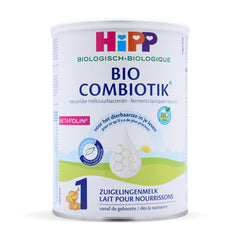

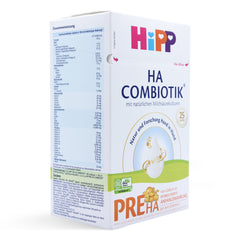
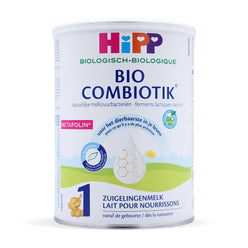
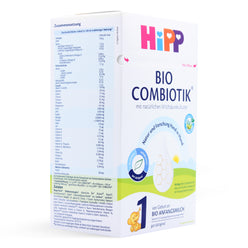
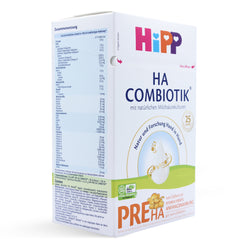



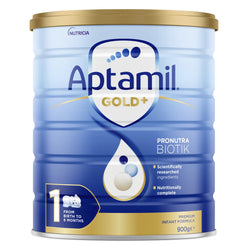






Aubriella Hayden -
I’ve always just focused on basic ingredients and didn’t pay much attention to prebiotics or probiotics. Now I can see why they might actually make a difference for digestion and overall gut health.
Sofia Thompson -
January 29, 2026
I remember sitting up late at night Googling every little change I noticed, wondering if it was normal or if I should call the doctor. My baby had days with more gas and fussiness, and I kept questioning myself if I was doing something wrong. What helped me was slowing down and really watching my baby—was she eating well, sleeping okay, and still having her usual wet diapers? I also learned how important gut health is, which made me more mindful about choosing a formula with prebiotics and probiotics to support her tummy in a gentle way. Even then, I trusted my instincts and didn’t hesitate to reach out to our pediatrician when something didn’t feel right. Being a mom teaches you that it’s okay to ask questions, and you don’t have to figure everything out on your own.
Rhonda Jang -
January 22, 2026
This really brings me back to when my little one was struggling with tummy issues and seemed so uncomfortable after every feeding. As a mom, it was heartbreaking to see, and I spent so many late nights reading ingredient labels and trying to understand what might help. We eventually tried a formula with both prebiotics and probiotics, hoping it would be gentler and closer to breast milk. It didn’t fix everything overnight, but after a couple of weeks, I noticed fewer gas pains and a much calmer baby. What mattered most to me was supporting my baby’s tiny gut in a more natural way. Every baby is different, but learning about prebiotics and probiotics truly helped us make a more confident choice.